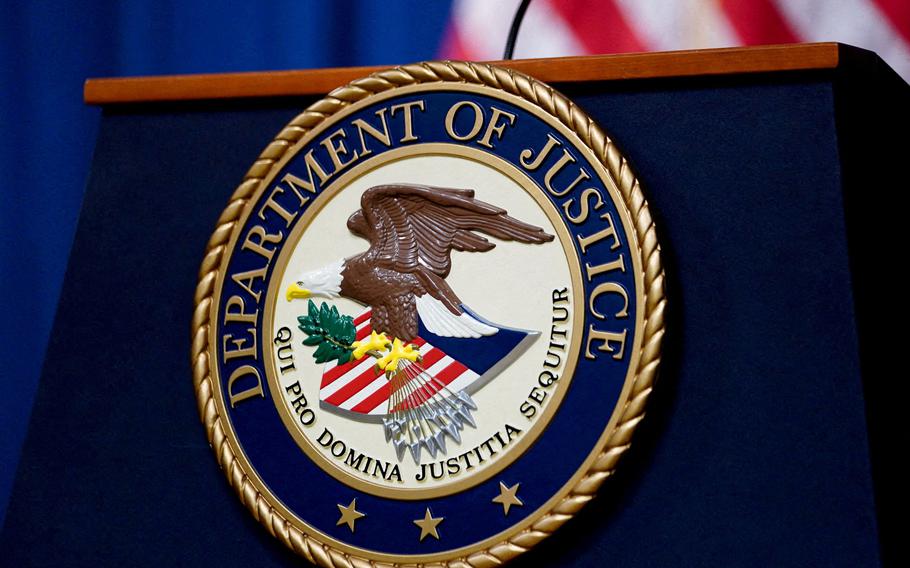
The seal of the Justice Department on a lectern in the department's headquarters briefing room in 2023. (Kevin Lamarque)
The United States is entering a particularly strange and dangerous era. As the Trump administration questions the existing world order and moves to distance itself from long-standing alliances and commitments, threats to our nation will inevitably adapt, evolve, and likely increase.
Some of these threats are overt and easily recognizable — China’s military ambitions regarding Taiwan, Iran’s pursuit of nuclear weapons, or Russia’s potential expansion into the Baltics. Others are more insidious, harder to detect, and just as dangerous. Among them is the growing threat posed by public nuisance and deceptive trade practices litigation targeting strategic American industries.
A key issue is the lack of regulation surrounding third-party funding of litigation, even when the financiers are hostile foreign governments or their proxies. Currently, no law requires these entities to disclose their participation in legal proceedings, creating serious national security risks.
A recent case in California illustrates the problem. In September 2024, the California attorney general and several environmental groups filed lawsuits against Exxon Mobil, alleging deceptive trade practices related to its plastics recycling program. The lawsuit’s funding came from the Intergenerational Environment Justice Fund, an Australian nonprofit controlled by the founder of the Australian mining company Fortescue. At the time, Fortescue was directly competing with Exxon in the green energy market and seemingly used litigation as a competitive tool.
In December 2023, the law firm hired by IEJF sought an advisory opinion from the Biden administration’s Department of Justice on whether it needed to register under the Foreign Agents Registration Act. The DOJ ruled that it did, citing concerns that the foreign client “may fund litigation on divisive issues to try to inflame tensions and sow division among the U.S. public.”
The most troubling aspect of this case is that, had the law firm not sought DOJ guidance — and had the DOJ not ruled as it did — no one would have known a foreign entity was behind the lawsuit’s funding. This particular instance involved a commercial dispute between competitors from allied nations. But what if the funder had been the Chinese Communist Party, the Russian government, or the Iranian regime financing litigation against an American energy company, aerospace firm, or semiconductor manufacturer? The potential for economic and security mischief is staggering.
Foreign-backed lawsuits could not only financially weaken critical U.S. industries but also expose sensitive information through the discovery process. Yet, as it stands, we rely on law firms to voluntarily disclose such foreign involvement and on federal agencies to make the right call when consulted. Would a Trump-appointed DOJ, for example, have required disclosure if a Russian-backed funder financed litigation against a U.S. company supporting Ukraine’s defense? The mere uncertainty underscores the urgent need for legislative action.
The world is changing rapidly, and our adversaries are not only driving much of this change but also adapting their tactics accordingly. To maintain our strategic advantage, the United States must recognize and counter these emerging threats. Rebuilding our military is one piece of the puzzle, but strengthening disclosure laws on foreign third-party litigation funding is an equally critical step in protecting national security.
Congress must act now to close this glaring loophole. Beyond legislative action, greater coordination between intelligence agencies, financial regulators and private industry is essential to identifying and mitigating these risks. Foreign adversaries are leveraging the opacity of legal financing to exploit America’s judicial system for strategic gain. Transparency and vigilance are our best defenses, ensuring that the rule of law cannot be weaponized against national interests. Failure to act will not only embolden our adversaries but could also undermine the very foundation of our economic and legal systems.
John L. Barry, a retired U.S. Air Force major general, served for more than 30 years as a combat fighter pilot, a graduate of the elite “Top Gun” Fighter Weapons School, and a military assistant to the secretary of defense. He held key leadership roles as a squadron, group and wing commander, culminating his career as a board member and executive director for the Space Shuttle Columbia Accident Investigation.